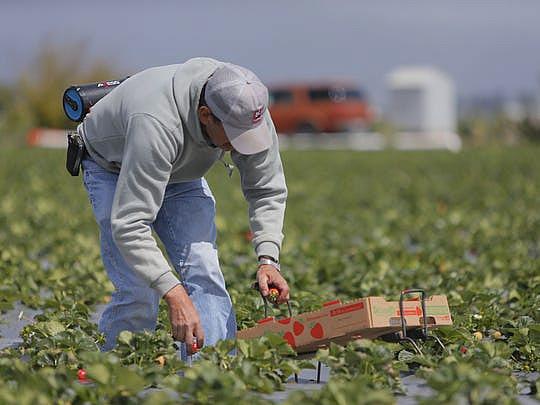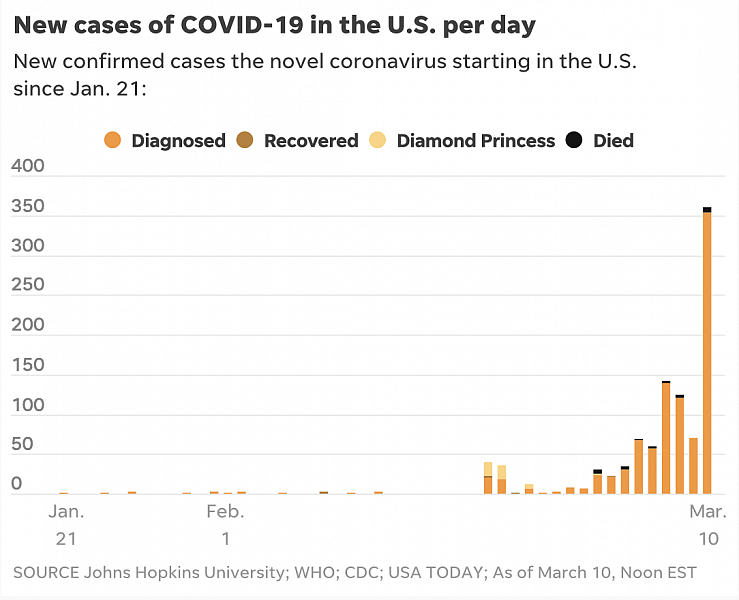Ag workers exempted from COVID-19 shelter in place mandate, advocates fear for health
This story was produced as a project for the 2020 California Fellowship.
Other stories in this series include:
Protected in the fields but not at home: Salinas H-2A farmworkers at risk
‘The perfect storm of vulnerability’: Protection in the fields doesn’t follow farmworkers home
Trump plans to halt immigration, California growers aren't thrilled
Monterey County ag workers comprise nearly a quarter of county COVID-19 diagnoses
Sixth person dies from COVID-19, Alisal and North Salinas hardest-hit in county
Monterey County growers face 'unprecedented losses' amid pandemic
Close quarters: Overcrowding fuels spread of COVID-19 among essential and service workers
Evicted Monterey County renters face greater risk of contracting COVID-19
Do California ag counties hold solutions to Monterey County farmworker housing crisis?
Monterey County advocates, growers urge renewed focus on farmworker housing
Housing bills aim to extend tenant, landlord protections for Californians amid pandemic

(Photo: Cristian Ponce/Staff photo)
Agricultural workers perform an essential service and will be exempted from Tuesday's shelter in place mandate, but farmworker advocates fear the protections in place are not strong enough to protect field laborers during the COVID-19 pandemic.
Growers and their advocates, however, say those fears are overblown.
Monterey County health officials announced they will join surrounding counties and order residents to shelter in place, leaving the home only to get food, medical supplies, exercise or walk pets, so long as residents do not congregate and maintain six feet of distance from others.
This followed the announcement that there are two confirmed cases of COVID-19, the novel coronavirus, in Monterey County.
"Without these farmworkers, food and crops would not be harvested and food would not come to grocery stores," said Monterey County Supervisor Luis Alejo. "I hope Americans realize how critical these farmworkers are during these trying times."

Farm industry groups and Monterey County Ag officials say the Ag industry already was taking many precautions to keep food clean and workers healthy before the coronavirus swept the globe.
More than 193,000 cases of the novel coronavirus have been confirmed, and more than 7,000 deaths have been tied to the outbreak.
The order issued in Monterey County is similar to ones issued Tuesday by six San Francisco Bay area counties, limiting activity, travel and business function to the most essential needs.
It does not affect essential government services, such as services to protect the health, safety and welfare of communities, the order read. It also makes provision for our agricultural community and fieldworkers who keep food in supermarkets and on the table, and provide other products for personal consumption.
"Farming, ranching and livestock businesses which provide food are exempt from the order," stated county officials in a Tuesday press release. "Those whose jobs include food production such as planting, harvesting, processing, packing and transporting may go to work but as much as possible comply with social distancing practices."
While ag workers themselves are not directly affected by the shelter in place order, businesses and industry related to agriculture could be, said Henry Gonzalez, ag commissioner for Monterey County.
Restaurants that have closed for the order's duration won't be purchasing food, he said. Other businesses may be awaiting guidance from the county as to whether the exemption applies to them, he said.
His office remains open but has already canceled large meetings and is pushing some work back, although inspections are still taking place.
"We perform critical activity in regards to ag, and inspect shipments to certify them so that they can be shipped to wherever in the country, wherever in the world," he said.
The United Farm Workers Foundation worries that farmhands are more vulnerable because they can't self-isolate for their jobs and have a history of being discriminated against.
"Across the U.S., we are seeing companies urging employees to work from home but unfortunately the farmworkers that harvest our food don't have that option," said Leydy Rangel, a communications specialist for the UFW. "There's a long history of farmworkers being excluded from basic rights."
Rangel referenced the Fair Labor Standards Act passed in 1932, which exempted domestic workers and farmworkers who, Rangel said, at the time were mostly black people. Now the majority of farmworkers are Hispanic or Latino, and that exclusion still exists today, she said.
"It's definitely concerning to the UFW Foundation that while most consumers are in need of food, right, that we're not paying attention to the workers that are making that possible for us as consumers," said Rangel. "The UFW conducted a poll on their Facebook page they asked (their followers): 'Have you been provided any information by your employer about the virus?' More than 90% (of respondents) said they hadn't received any information about taking preventative measures against the virus in the workplace."
The Grower-Shipper Association of Central California, however, says farmers are taking additional steps, including "revising and increasing sanitation procedures for all field facilities," in a press release.
Farms and processing plants also already had strict standards about handwashing, including in the fields, and disinfecting, both important steps to stop the virus, Monterey County Agricultural Commissioner Henry Gonzalez said.
Social distancing, in which people keep at least six feet between them, is also not difficult in the fields, he said.
"The workers generally don’t work in congregations. They do work in crews, for example, harvesting strawberries," he said. "But even then they’re able to maintain the social distancing."
The Grower-Shippers also said California already has strict laws in place for farmworkers, such as "paid sick leave for farm workers as well as health care benefits for most farm employees" and training is being "reviewed and updated" for them.
While farmworkers are able to accrue paid sick leave after 90 days of employment, the UFW is calling for the state to extend required sick pay to 40 hours or more, and remove the caps on recurring sick pay, as well as waive the 90-day waiting period for new workers to accrue sick pay.
At D'Arrigo Brothers, the company to which the Andy Boy brand belongs, workers are being told to stay home for 14 days after travel, and not to report to work if they are showing any signs of sickness.
"They must be symptom-free before they come back," said John D'Arrigo, the president, CEO and chairman of the board of D’Arrigo Brothers.
"We’re doing as much as we can and so we’re prepared for this coronavirus thing," D'Arrigo said. "We’re wiping down everything and everyone’s doing what they can to make this as safe an environment as possible."
D'Arrigo Brothers has a collective bargaining contract with the United Farm Workers which does have a sick leave policy in place, D'Arrigo said. He did not provide specifics.
Rangel also said growers should stop asking for doctors' notes and place laborers on paid leave for the duration of their illness if they are infected with the coronavirus.
The UFW "urges employers to consider taking necessary steps important for the health of all of us," said Rangel.
Another worry for the agricultural industry is the visa process, Rep. Jimmy Panetta, of Carmel Valley, said in a press release.
He said the U.S. Department of State suspended nonimmigrant visa processing Tuesday — including H-2A agricultural visas, citing the coronavirus outbreak.
The agricultural sector relies on about 250,000 H-2A visa workers annually for seasonal jobs, so losing them "poses a serious and significant barrier to ensuring our nation's food security in these trying times," Panetta said.
He called on the state department to resume processing visas for returning H-2A workers who are eligible for waivers of the in-person visa interview, extend those waivers for returning workers who have been interviewed in the previous two or three years and allow new visa workers ineligible for waivers to request a visa interview under the emergency travel exception during this coronavirus crisis.
The agricultural industry is enormous in Monterey County.
It brought $4.25 billion directly into the county in 2018, the most recent year for which figures were available, Agricultural Commissioner Gonzalez said.
Those dollars also generated an estimated $3.75 billion in additional economic activity in the county.
But the industry was already facing a scarcity of workers before concerns about the coronavirus surfaced.
Gonzalez said he hasn't heard anything about agricultural companies trying to hire more workers beyond their attempts to address the previously existing shortage.
In addition, the dry weather of January and February allowed growers to start picking crops earlier than normal this year, he said.
"This rain that we’ve had past few days is of course very welcome. It has slowed things down," he said. "But once things dry up, it’s going to go full blast."
Multimedia Journalist Joe Szydlowski contributed to this story.
Kate Cimini is a multimedia journalist for The Californian. She reported this story with support from the California Fellowship through the USC Annenberg Center for Health Journalism. Call her at (831) 776-5137 or email kcimini@thecalifornian.com. Subscribe to support local journalism.
[This article was originally published by The Californian.]

